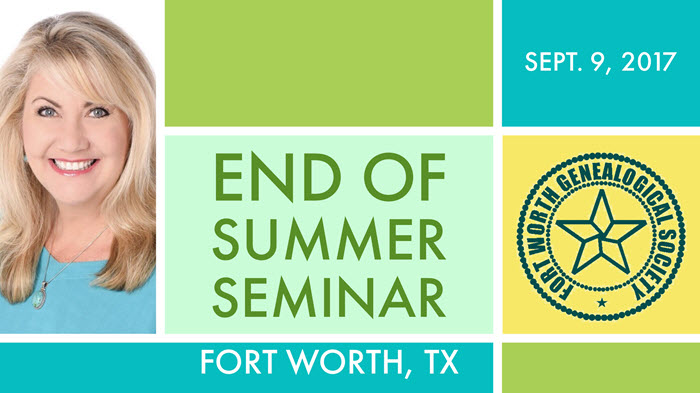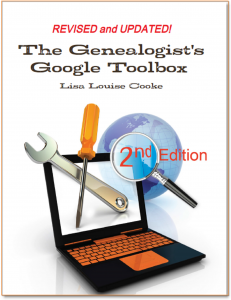by Lisa Cooke | Sep 5, 2017 | 01 What's New, Conferences
Recharge your genealogy research at the Fort Worth Genealogical Society End of Summer Seminar this Saturday, September 9, 2017. Genealogy and technology expert Lisa Louise Cooke will help you to discover, organize and share your family history more effectively.

If you’re in or near Dallas/Fort Worth, Texas, you’re invited to attend the Fort Worth Genealogical Society ‘s End of Summer Seminar this Saturday, September 9, 2017.
To celebrate their 60th anniversary, the Society has invited internationally-renowned genealogy and technology expert Lisa Louise Cooke for a full day of genealogy fun and inspiration. She’ll be presenting four sessions packed with simple yet powerful strategies, how-to’s and examples that will help you discover your family history more effectively online, organize what you learn, and share it with attention-getting style.
THIS SATURDAY: Fort Worth Genealogical Society Seminar Details
Here’s what’s happening:
What: 2017 End of Summer Seminar
Where: Trimble Tech High School, 1003 W. Cannon Street, Fort Worth, TX
When: Saturday, September 9, 2017, 8:45 am – 4:30 pm (doors open at 8:15 am for registration)
Hosted by: Fort Worth Genealogical Society
Lisa will be teaching some of her most empowering classes–the ones that give attendees immediate action items to help them take the next steps in their own genealogy research. Three of the four classes are entirely new in 2017. Here they are:
1. Google Books: The Tool You Should Use Every Day! Over 25 million digitized and searchable free books are at your fingertips with Google Books. Learn how to make the most of this goldmine chock full of historical data. (This was a BIG hit at Rootstech,)
2. Create a Free Google Earth Map Collection for Your Research. Learn how to find free digital maps for your ancestral locations, add them as permanent overlays to Google Earth, and then organize them into your personal map reference collection. You’ll learn best practices for keeping them organized and enriching your research.
3. Making Evernote Effortless. Learn the best strategies for making Evernote a breeze to use for your genealogy research. Shave time off your note-taking with quick keys, shortcuts, saved searches, search operators, Reminders, note sharing, source citation, and building Evernote into any browser you use (including mobile devices). (Evernote is one of the world’s top free organization tech tools: click here to learn more about it.)
4. 7 Awesome Apps that Eliminate Eye-Rolling! Eliminate your relative’s bored eye-rolling and captivate them with compelling stories and imagery! We’ll cover seven easy-to-use and free mobile apps that will help you tell your family history stories in a riveting way.
More Learning Opportunities with Lisa Louise Cooke
 If you can’t make it this weekend, you can still get the benefit of Lisa’s expertise and inspiring teaching style.
If you can’t make it this weekend, you can still get the benefit of Lisa’s expertise and inspiring teaching style.
First, head to her Seminar schedule to see if she’ll be headed to a town near you!
Then, check out her books and quick guides. They are packed with her signature approach to technology: she shares creative ideas and simple, step-by-step instructions for using powerful, mainstream and mostly free technologies for family history.
- The Genealogist’s Google Toolbox (2nd edition) is a must-have for all family history researchers who work online (and that’s just about everyone). Find detailed instructions and explanations for making your Google searches more effective, along with entire chapters on using Google Earth, Google Books, Google Scholar, Google Alerts and even YouTube for genealogy.
- The Evernote for Genealogists quick reference guide (available for Windows and Mac users) is a handy cheat sheet you’ll want to keep close at hand. It takes you from the “getting started” level quickly into navigating Evernote to maximize and organize your research note-taking.
- Mobile Genealogy: How to Use Your Tablet and Smartphone for Family History Research will help you put your iPad, tablet and/or smartphone to work for your genealogy research. This expanded second edition of her original, groundbreaking book on mobile genealogy goes into greater depth with more apps and is loaded with tips and tricks that make your mobile device a genealogy powerhouse.
by Diahan Southard | Mar 13, 2015 | 01 What's New, British, Canadian, Digital Archives, Records & databases
 We learn about so many fantastic new genealogy records online every week. So each Friday we round up several of them for you to glance through. Watch for databases and documents that your ancestors might appear in–but also watch for the kinds of records that may be out there already, that you haven’t yet looked for. This week: British women in World War I, Polish-American marriages, Irish vital records, Canadian travel photography, Scottish artifacts and documents and a Louisiana (US) press archive.
We learn about so many fantastic new genealogy records online every week. So each Friday we round up several of them for you to glance through. Watch for databases and documents that your ancestors might appear in–but also watch for the kinds of records that may be out there already, that you haven’t yet looked for. This week: British women in World War I, Polish-American marriages, Irish vital records, Canadian travel photography, Scottish artifacts and documents and a Louisiana (US) press archive.
WWI WOMEN. FindMyPast has posted over 9,500 UK records that illustrate the various roles played by woman during the Frist World War. These include:
POLISH-AMERICAN MARRIAGES. A new database of Polish-American marriages has been posted by the Polish Genealogical Society of Connecticut and the Northeast.
According to a press release, “This database contains the names of couples of Polish origin who were married in select locations in the Northeast United States. The information was taken from marriage records, newspaper marriage announcements, town reports, parish histories or information submitted by Society members. The time period generally covered by these lists is 1892-1940. It includes the States of Delaware, Massachusetts, New Hampshire, New Jersey, Rhode Island and Vermont. Connecticut and Jersey City, NJ will be added at a later date.”
IRISH BMD. Over a million records appear in a new database of Irish records of the city and county of Derry~Londonderry and Inishowen, County Donegal. Entries span 1642-1922 and include:
- Pre-1922 civil birth and marriage registers,
- Early baptismal and marriage registers of 97 churches,
- Headstone inscriptions from 118 graveyards, and
- Census returns and census substitutes from 1663 to 1901.
Click here to access these records (and other County Derry resources) at RootsIreland,ie (subscription required).
CANADIAN TRAVEL PHOTOGRAPHY. A small but visually rich collection of pictures promoting Canadian tourism is now at Flickr Creative Commons. Use these to explore places your ancestors may have visited (and the images that may have lured them there) if they vacationed by rail in the 1800s or early 1900s. (Click here to learn more about finding great historical photos at Flickr Creative Commons.)
SCOTTISH ARTIFACTS AND DOCUMENTS. A new digital archive at Historic Scotland has launched an online database of 400 artefacts now includes over 400 artifacts important to Scottish history. Everyday household objects, ship models, coins, weaponry, bits ‘n bobs of old homes and buildings, industrial machinery and miscellaneous photos, books and ephemera are all browsable on this site. It’s a great place to look for images that help illustrate your Scottish ancestors’ history.
LOUISIANA PRESS COVERAGE. The Louisiana Digital Media Archive has launched as “the first project in the nation to combine the media collections of a public broadcaster and a state archives,” according to its site description. “This ever-expanding site contains a combined catalog of thousands of hours of media recorded over the past half-century. You can see interviews with Louisiana civil rights pioneers, notable political figures, war heroes, artists and literary icons. You’ll have a front row seat to Louisiana history through video of historic events. You can also visit remote and endangered Louisiana places and cultures.”
 Not sure how to find record sets like these for YOUR family history? Here’s a tip! Set up a Google Alert. Say you want to know whenever new material on Polish-Americans in Detroit is found by Google’s ever-searching search engines. Click here to learn how to set up this search (or any other) Google Alert for genealogy.
Not sure how to find record sets like these for YOUR family history? Here’s a tip! Set up a Google Alert. Say you want to know whenever new material on Polish-Americans in Detroit is found by Google’s ever-searching search engines. Click here to learn how to set up this search (or any other) Google Alert for genealogy.
This tip comes to you courtesy of the book The Genealogist’s Google Toolbox, Second Edition by Lisa Louise Cooke–the fully-revised 2015 edition that’s packed with strategies that will dramatically improve your ability to find your family history online.
by mbarker | May 30, 2018 | 01 What's New, Archives, Mobile
A new “Archivist in a Backpack” project to support community archiving offers genealogists a great idea: a portable archiving kit for on-the-go genealogy research and preservation projects. The Archive Lady Melissa Barker explains the initiative and offers...

 If you can’t make it this weekend, you can still get the benefit of Lisa’s expertise and inspiring teaching style.
If you can’t make it this weekend, you can still get the benefit of Lisa’s expertise and inspiring teaching style.

